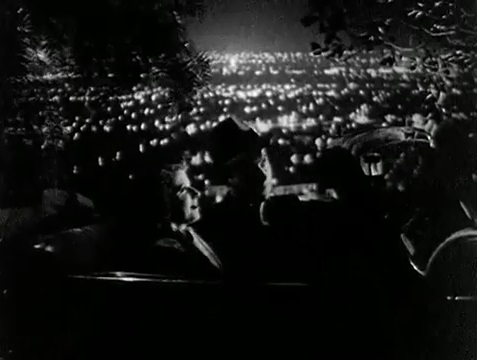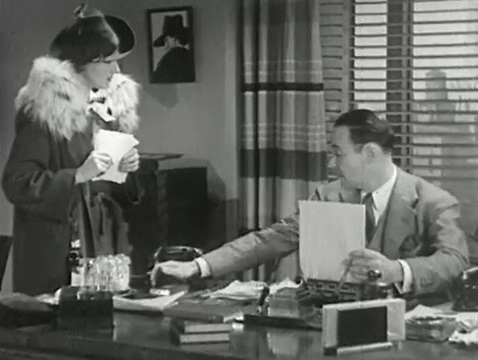War
Babies
A one-reel satire
of Flagg and Quirt, doughboys in diapers at a milk bar somewhere in France,
where the chanteuse is Temple similarly attired.
What’s to Do?
Rich kid has his
father send an employee and family to a distant branch office, thus disposing
of a high school rival.
The latter feigns
sick in bed, but owing to a previous engagement, has to leap out his bedroom
window to knock a homer for his team and round the bases at top speed, then all
in one motion dive back in again.
Two schoolchums
pile up in an overcoat to doctor him. A cake goes awry in all this.
A perfect comedy.
The Gold Ghost
The new sheriff
of Vulture County, Nevada (county seat Vulture City, where “the boom is
busted” since 1898, as Robert Frost told John F. Kennedy), a Boston man.
“Bugs”
Kelly drops in, the notorious “gangster pilot”.
Keaton washing
out a few things on Main Street goes into Peckinpah’s The Ballad of Cable Hogue, the general situation mirrors
Altman’s McCabe & Mrs. Miller.
Allez Oop
Ye Oldee Clockee Shoppee.
Apollo The
Wonderful out, Keaton in.
The Jungle King
in The Love Call averted.
Restless Knights
Queen Anne of
Anesthesia presides at a royal wrestling match and is abducted by her prime
minister, who wants the throne.
An obscure
political allegory (cp. Jules White’s Three Dark Horses).
One Run Elmer
Between New York
and Los Angeles, in the vicinity of Tombstone, Keaton and Lamont invent
Peckinpah’s The Ballad of Cable
Hogue and Meyer’s Supervixens.
Bearcats and Rattlers
settle it on the desert diamond.
Tars and Stripes
Charles Lamont is
the author of this story that turns the tables on the dreaded Chief at a Naval
Training Station (this one’s San Diego). Even a recruit “as bright
as a Marine” deserves a medal for getting naval officers out of the
briny, that and more.
Buster Keaton, Vernon Dent, Dorothea Kent. That hole in the ground dug by practicing
about-face goes into Rosenberg’s Cool
Hand Luke.
The E-Flat Man
A twenty-minute
poem on the theme, “we were just eloping, we was.”
Grand Slam Opera
The brush in
Gopher City, Ariz. Arrival in New York, fuss with a girl, debut on Colonel
Crow’s Amateur Night (Anvil Chorus). Return.
A Keaton
extravaganza, a delay on film.
Below the Deadline
Canal St., above
the Financial and Diamond districts (Lamont moves out of a freeze-frame behind
the elegant credits onto Wall St.). An Irish cop wants to make detective and
marry the girl. Plush mobsters ride roughshod over him, rob the firm she works
for, and set him up as the fall guy.
Lamont controls
the dialogue characteristically in the first half, then lets the apparatus take
over. The cop is arrested, train-wrecked, plastic-surgeried, triumphant,
married and promoted.
The makeup for
his appearance on the beat anticipates the inspector in Mankiewicz’ Sleuth.
His girl queries him from the police manual as they sit together in her
mother’s parlor. Extraordinary touches abound, like the passenger who
questions his presence on the train, and vexed walks away.
Playing the Ponies
Flounder Inn
(Stooges, prop.) is flounderin’, they buy a swayback named Thunderbolt.
Everything
ridin’ on a horse full of hot peppers, to make him drink (cf. Rydell’s The Reivers).
International Crime

The whirligig of
crime is the stuff of The Shadow’s 8 P.M. radio broadcast by linkup from Lamont
Cranston’s office at the Daily
Classic. Phoebe Lane the owner’s niece wants
action and is made his assistant. “Young lady,
you’re impossible.”
“Not if the
right man comes along,” which is why the radio theme is Saint-Saëns’
Le Rouet d’Omphale, Op. 31. A
false tip, “a merry-go-robbery”, Commissioner
Weston calls it. “Oh Mr. Cranston, wait for Phoebe!”
The murder suspect, a safecracker called Honest John, “is just as
innocent as a new-laid cornerstone.” Weston
locks up Cranston in “a hicktown hoosegow”
to stop his column “unless he changes his tune and lines up on our side,” his editor pleads, “the
news is public property!"
Cranston out on a
“hab’as corpus” sizes up the
situation, “he’s been sticking a knife in me with one hand and patting
himself on the back with the other, and you fell for it.”
“Take a
general order,” says the Commissioner. What to
do next? “You mean,” Phoebe inquires of
Cranston, “you don’t
know?” He replies, having poured himself a belt from his office bottle
after a tête-à-tête at the “microscope”
with gun-wielding Honest John anxious to clear his name of amateurishness in
the murder by exploding safe of “a good man, a charitable and benevolent
man” in his own home, “that’s right, the Shadow doesn’t know.” All
news is cut off to the Classic. Phoebe is “a gentleman and a lady.”
Where’s the tipster, a Viennese evidently? “When
you want to find an American, you go where he works. When
you want to find a foreigner, you go where he dines.” The
Bubble Over Club and every other nightclub, with Phoebe. “America
is a land of women so beautiful, they all look alike.”
Question of
apologies, “let’s not go overboard in our enthusiasm for whitewashing
ourselves.” Question of bond issues, debentures,
“if the fifty million is spent to build up the army as intended, the
exiled aristocrats will never succeed with their threatened revolution.” Cf. Neame
& Owen’s A Man Could Get Killed.
“After all,”
says the Commissioner, “we’re professionals... take a general
order.” The Daily
Classic goes to press, The Shadow prepares to broadcast “a big
surprise to the police... to keep the confidence of our readers, to prove that
we try to expose stupidity wherever it exists. For
years we’ve been trying to educate them and their children to obey the
law.”
Cf. Werker’s
The Adventures of Sherlock Holmes,
Pollock’s Murder Ahoy.
Leonard Maltin, “breezy, entertaining quickie is graced with
snappy dialogue... witty, urbane”.

Salome, Where She Danced
One of the most
powerful works of analysis ever put on film, a vision of the postwar world
antedating Diego Rivera’s by a few years, and a major influence on Ken
Russell (The Devils, The Boy Friend, Lisztomania and Salome’s Last Dance are all
visible).
The sheer dazzle
of this jaw-dropping masterpiece is in every detail, as when the heroine is
abducted by a Western bandit and taken to his camp. The camera pans across
bandits singing around bivouac fires under the stars in a scene lifted lock,
stock and barrel from a Romantic opera, and when the lady refuses the bandit’s
advances, he says, “why not, isn’t this romantic enough for
you?”
If you
don’t choke and splutter like Shemp Howard nonplussed, watch it till you
do.
Abbott and Costello Meet the Invisible Man
He is, get this,
a prizefighter who don’t take a dive for the Syndicate.
On the one joke,
Lamont takes over the franchise from Whale and May et al. Every resource
in the panoply comes into play, a three-handed poker game especially.
“Not that a
story line means anything to A & C,” observed the New York Times
with habitual gall.
Abbott and Costello Go to Mars
The film is in
three parts of increasing complexity, a fact known to more than one reviewer
who has found his task made irritatingly difficult thereby, and resented it.
Before the launch,
a straightforward comedy, very funny.
The accidental
liftoff carries Lester and Orville to New York City, where they whiz around
buildings and through the Lincoln Tunnel, then to a landing outside New
Orleans, which they take to be Mars. Everyone in town is wearing an outsized
papier-mâché head for Mardi Gras. Two escaped convicts (Horace McMahon, Jack
Kruschen) find the spaceship, borrow spacesuits for a bank robbery and plan an
escape to Mars.
Lester and
Orville, now wanted by the New Orleans police, return to the spaceship and are
forced to take off again. They land on Venus, which at first they take to be
Los Angeles on account of the atmosphere. Men were banished four hundred years
ago, the long-lived beauties of the Queen’s court make Orville their
King. The Queen (Mari Blanchard) subjects Orville to the control of a
truth-telling device (three gold balloons, like a pawnbroker’s symbol,
that burst if he admires a girl), then torture. She disenchants the Venusians
by showing them pictures of the he-man King and Ministers she banished. The
four men return to Earth via the
Lincoln Tunnel.
The private
venture that has built the spaceship closely resembles the one in Pichel’s
Destination Moon.
Abbott and Costello Meet Dr. Jekyll and Mr. Hyde
Dr. Jekyll, the female
Zampano, dreams of an ideal world without bloodshed and war, achieved by
medicine. The dual nature of man will benefit by halving, the Good must remain,
the Evil be expunged.
In the opening
scene, he has injected himself with the experimental formula that turns him
into Mr. Hyde, so as to strangle a colleague who laughed at his theory.
His
jealously-protected ward Vicky is the star of the Jubilee Music Hall and by day
a leading suffragette. She and the chorus girls clamor for equal rights with a
song and high kicks in Hyde Park. Crime reporter Bruce Adams signs her
petition.
Slim and Tubby
are American policemen serving as bobbies in an exchange program. They are
pummeled and plowed under by the women during a battle between the sexes in the
park, the Inspector fires them. To win reinstatement, they seek the monster.
The next act
after the girls at the music hall is a Chinese dancer and her monstrous
paramour. Hyde is pursuing the newspaperman, who is pursuing Vicky. Slim and
Tubby follow the monster backstage, the delicate intricacies of the entire film
are stated rapidly among the dressing rooms, where Tubby looks for clues
“in the clues closet” and sees the monster in a mirror, while Slim
finds Hyde wearing the Chinese demon mask and costume.
Tubby is turned
into a white mouse at Dr. Jekyll’s lab, he scares away the clientele at a
pub. Something he drank, Slim concludes. The basement lab is now a wine cellar,
he selects a bottle of Moselle (pronounced “Mousel”), Tubby soon
sees Slim as a mouse.
Jekyll loves
Vicky, proposes to inject her. Hyde reappears by accident, Tubby is made to sit
on the needle repeatedly, two monsters are reported all over London. An elderly
suffragette is hectoring the crowd in Hyde Park, “we shall show the world
that we are the stronger sex, I will be your leader!” Tubby the monster
upends her and hides in a pram. Hyde dies in a fall, restored to Jekyll.
Four bobbies
bring in Tubby, he has bitten them all and now bites the Inspector, whose wall
map of the city is full of new pins. Tubby is subdued and restrained but,
unnoticed, returns to his usual self. Slim proclaims a triumph, the five bitten
police officers, suddenly monstrous, chase the pair away, right through doors
that are shut fast.
The best analysis
is by Ken Russell in Savage Messiah. Slim tells Tubby, “if doctors
didn’t experiment, they’d never find new cures for you.”
Abbott and Costello Meet the Keystone Kops
The drama
director Sergei Toumanoff is a con man named Gorman whose stunt men are his
victims, they have the last laugh when his pictures turn out comedies.
Mack
Sennett’s Police Patrol catch him absconding with the budget for the next
one, a picture very much up in the air.